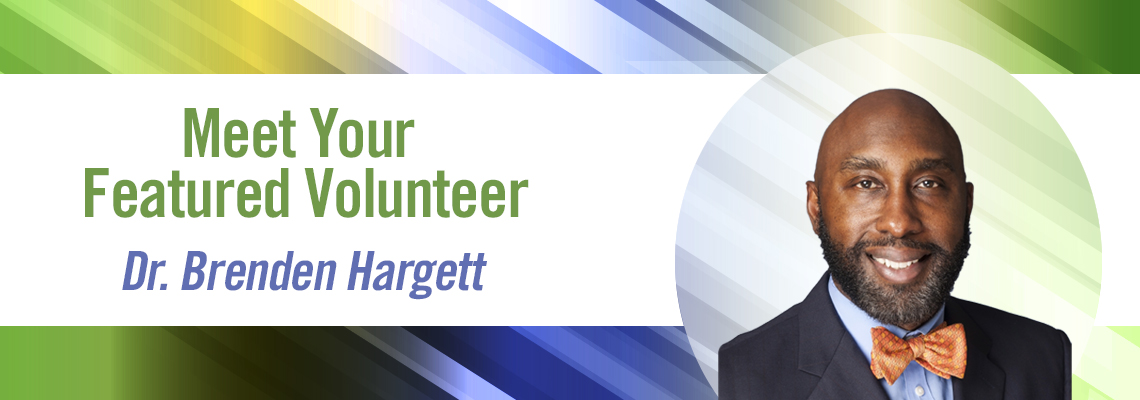
Foundation Connections

Foundation Volunteer Draws On Life Experiences to Mentor Others
Published 10/22/2019
Many counselors choose the profession knowing they were called to give back to communities in need, while others shift into the profession from a different career path after witnessing a need for counselors. Dr. Brenden Hargett began his journey as a professional counselor in 1994 after working in state government.
Dr. Hargett explains that he was first interested in counseling after serving as an intern with state government as an undergraduate. His initial professional goal was to become a lawyer, but after his experience with the Department of Corrections serving the Inmate Grievance Board, he says, “I learned of the great need for counseling and rehabilitation to those persons who were incarcerated.”
Thankfully, Dr. Hargett’s experience witnessing the need for more professionals in the areas of counseling and rehabilitation influenced his career change to pursue a better world of mental health wellness for those who are incarcerated.
While earning his counseling degree, Dr. Hargett’s focus was on providing direct service to those who struggle with substance abuse. As he continued to work in the field of substance abuse counseling, he later branched out into marriage and family work, community mental health, child protective services, and higher education.
Dr. Hargett began his volunteer role with the National Board for Certified Counselors (NBCC) by working on committees for the National Counselor Exam. He was also a member of the Ethics Review Committee, and he currently holds a role reviewing the Master of Addictions credential. His involvement with the NBCC Foundation was a smooth transition due to his familiarity with NBCC and Affiliates.
Dr. Hargett has served as an NBCC Foundation presenter for events such as the annual Bridging the Gap Symposium in 2017 and 2019. “Serving with the NBCC Foundation has been rewarding professionally by watching the development of students throughout their yearlong process,” says Dr. Hargett.
He views mentoring as a rewarding experience, especially as a professional counselor. For him, it is a way of giving back both professionally and personally, and “it allows one to cultivate counseling skills of newer professionals and helps mentees avoid some of the professional pitfalls that may lie ahead of them.” The task is personally beneficial to Dr. Hargett because it “causes mentors to reflect on some of the foundations of counseling that we may have moved away from or forgotten.”
Dr. Hargett says his goal as a mentor is to help lay the foundation and as best as he can prepare his mentees in ways in which he wasn’t prepared starting out in the profession. He gives thanks to the important people in his life who influenced and assisted in transforming him into the person and professional he is now.
He looks to his father as the prime example of what it looks like to serve the community. “My father served his community at large and, in my opinion, was a lay counselor who worked to help those around him find solutions to their problems. He was a disabled Korean War veteran who overcame the trauma of war and disability and built a successful business, all while mentoring even his competitors and other men and women towards their goals and dreams. He was my perfect example of overcoming the odds, and I take this experience into the mentoring relationship with the notion of helping mentees to overcome any challenge they may be presented with,” shares Dr. Hargett.
Though rewarding, mentoring up-and-coming counseling professionals does come with its fair share of challenges. Dr. Hargett stresses the importance of understanding how to properly assist each mentee without letting personal feelings or biases hinder that relationship. He feels that “each mentee has their own unique needs, so learning to adapt to those needs and mentor accordingly versus pushing my own agenda is important.”
He notes one of his most successful moments of assisting a mentee was when he was able to motivate them to push through professional and personal challenges, while witnessing his mentee experience tremendous growth through the difficult process. This led his mentee to seek and obtain the employment of their choice. “Being a part of the development was rewarding and made the efforts worthwhile,” says Dr. Hargett.
Dr. Hargett also addresses how new counseling professionals and aspiring counselors are now more than ever before addressing a client’s traumatic history and experiencing how clients present unresolved trauma. He says, “Mentees will need to have guidance to assist clients in unpacking the layers of unresolved issues but must be armed with interventions and strategies to move individuals toward growth and development.” In addition, he believes that new counselors must possess the knowledge, awareness, and understanding of social justice issues and how they overlap with trauma, as these issues continue to challenge members of our society every day.
As illustrated by his dedication to his profession and new counselors, Dr. Hargett emphasizes the value mentoring and volunteering in the community hold in both his professional and personal life.
Dr. Hargett shares, “Mentoring is a very small part of who I am. I serve as a volunteer for a few other organizations and as a minister in my local church,” and he expresses his goal to continue contributing to the profession of counseling through teaching, clinical supervision, and research. “Being able to expand these tasks and lend my skills or experience to the development of students and mentees is important to serve as a gatekeeper for the profession. Eventually, I would like to expand my own mentoring work to serve young African-American males in my community.”

